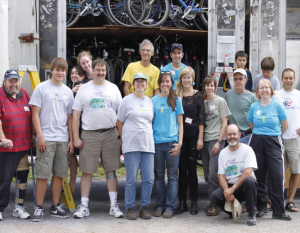by Joanne Heidkamp
Spring 2011 InGear
The relationship between the Green Mountain Returned Peace Corps Volunteers (GMRPCV) and Pedals for Progress began in the summer of 1999, when David Schweidenback approached us for a donation to P4P. We donated $100 and also decided to hold Vermont’s first P4P bicycle collection. That first year we collected 88 bikes and drove them down to New Jersey in a rented U-Haul.

Twelve years later, the GMRPCV is still holding annual collections for P4P and, although the number of bikes varies considerably from year to year, our average collection yields 200 bikes and about $1900 for shipping, as well as many sewing machines. In the last three years we’ve added sewing machines to our outreach, and have collected many of those as well.
Here are some of the key elements that help ensure our continuing success: One huge factor is the support of the local FedEx station, which has provided free shipping from Vermont to New Jersey since 2002. The day before our collection, FedEx drops off a semi truck with four empty containers. When the collection is over, FedEx delivers the containers to New Jersey on a space-available basis. The bikes will arrive at the P4P warehouse anywhere from two weeks to two months after they’ve been collected.
Although the GMRPCV has been the main organizer of the collection each year, a number of local groups have come on board to help promote it, and also help process bikes during the four-hour event. Local Motion, a local bike–pedestrian group, has been steadfast in its support. Several regional solid waste districts have also promoted the collections on their websites and through their newsletters. And we’ve had assistance from teen organizations at high schools and congregations, and from a few local Rotary clubs.
Since the original collection, all of our outreach and announcements for the event have stressed the need for a cash donation, which is critical for shipping, along with each bike or sewing machine. Posters at the collection reinforce the idea that a donated bike is useless unless we can raise enough money to get it to our partners in the developing world, and we always remind people that if they don’t have a bike or sewing machine to donate, donating money for shipping is also a good way to get involved.
We have learned that coverage in the local newspapers is essential to getting lots of bikes donated. For a few weeks before each collection, the group sends out lots of press releases, emails, and posts on Facebook. The area’s largest newspaper, the Burlington Free Press, usually runs a photo and caption about the bike collection during the week before the event; and a number of “hometown” papers will run an article if we focus the story on a volunteer who lives in the community. We also mail a postcard to everyone who donated a bike during the collections of the previous two years. Contacting people via various email lists has also become more important with each passing year.
The group gets a big boost every year from a “one man collection” organized by Gene Bianco, who runs an independent chimney cleaning and repair business in Randolph, Vermont, about an hour from Burlington. Bianco heard about the event in 2004, and started to collect bikes and donations in his community. That first year, he arrived with 31 bikes and $310. His efforts have expanded — in 2009 his truck and trailer were loaded with 75 bikes.
